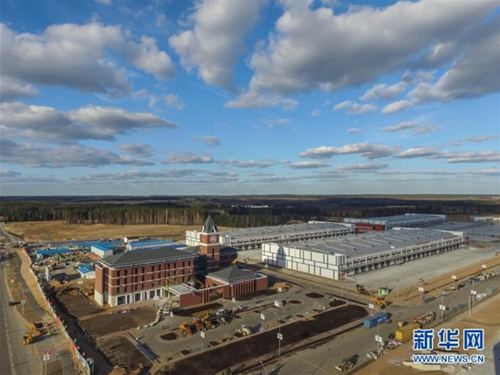Belarus unrest ‘won’t shake BRI cooperation’ with China
By GT staff reporters Source: Global Times Published: 2020/8/17 20:43:40

Photo shows the construction site of the China-Belarus industrial park, located 25 kilometers from Minsk. As of 2017, the industrial park, developed under Belt and Road Initiative, has already attracted 23 companies from China, Belarus, Russia, US, Germany, Austria and Lithuania. Photo: Xinhua
The ongoing protests in Belarus, a vital traffic hub in Eurasia, will not pose threats to the country's cooperation with China, especially on projects under the Belt and Road Initiative (BRI), and companies in the key industrial park and Chinese scholars are speaking highly of bilateral relationship.
An employee of The China-Belarus Great Stone Industrial Park reached by the Global Times on Monday said that most of the Chinese companies in the park were not affected by the social unrest in Belarus, and the BRI projects in the country were unlikely to be impacted in the future.
The China 15th Metallurgical Construction Group, a Minsk-based Chinese corporation, told the Global Times Monday that its daily operations had been affected as suppliers and a few Belarusian employees went on strike. However, a spokesman confirmed that the company did not expect any change to its plans, as it believes the unrest will be temporary.
Another Belarus-based Chinese company, China Machinery Engineering Corp, confirmed to the Global Times that all of its Chinese-Belarusian programs are going on as usual in Minsk.
According to statistics from China's Ministry of Commerce released in August, there are 63 enterprises in the park, with investment surpassing $1 billion. More than 70 percent of the enterprises are production-oriented, involving machinery manufacturing, new materials, electrical appliances, medicine and medical supplies. The rest are mainly engaged in scientific research and project services.
The industrial park counts for a lot for Belarus, as the country sees it as an industrial hub that can drive reform and its opening-up to the outside world, said Wang Yiwei, director of the International Affairs Institute at the Renmin University of China.
"It is not the first time for the Western governments to give Belarusian President Alexander Lukashenko a hard time. Once the protests pass, Belarus will consolidate its cooperation with China and take China as a model of opening-up, and I think the industrial park will be well protected," Wang noted.
"The significant position of the industrial park can radiate throughout Europe and bring the BRI to all of Europe. Therefore, it is a pillar and important pivot for bilateral cooperation," said Li Xin, director of the Center for Russian & Central Asia Studies at the Shanghai Institutes for International Studies.
China is the third-largest trade partner of Belarus and its largest one in Asia. Last year, bilateral trade hit $2.71 billion, growing 58.5 percent year-on-year, data from China's Foreign Ministry shows.
In addition, China remains a key buyer of Belarus' flax, tractors and potash fertilizer, Li noted.
In May, the Belarusian Potash Co (PBC) signed a potash supply contract worth $220 a ton with a consortium of Chinese companies, including Sinochem, CNAMPGC and CNOOC. BPC exports of potash fertilizers account for approximately 20 percent of the global potash export market. China remains the world's largest consumer of potash and in recent years has set global price benchmarks.
Belarus was one of the first countries to support the BRI and sign a cooperation agreement with China in 2014. The Belarusian Ambassador to China Kiryl Rudy once mentioned that the location of Belarus enables it to play an important role as a logistics and commodity distribution hub in the building of the BRI.
Global Times
Posted in: ECONOMY,BIZ FOCUS